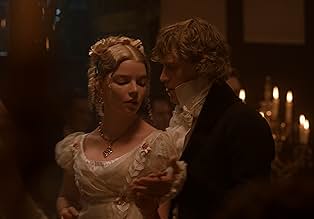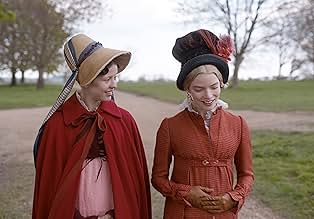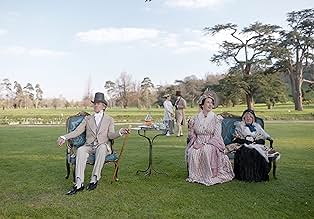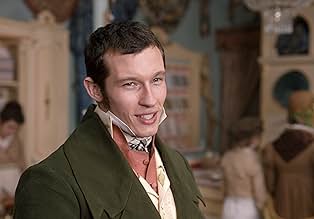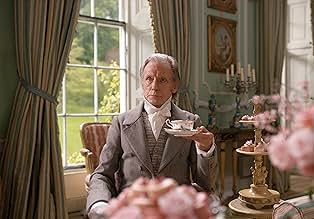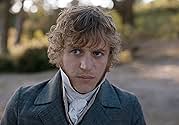Nell'Inghilterra del 1800, una giovane donna ben intenzionata ma egoista si intromette nelle vite amorose dei suoi amici.Nell'Inghilterra del 1800, una giovane donna ben intenzionata ma egoista si intromette nelle vite amorose dei suoi amici.Nell'Inghilterra del 1800, una giovane donna ben intenzionata ma egoista si intromette nelle vite amorose dei suoi amici.
- Candidato a 2 Oscar
- 11 vittorie e 61 candidature totali
Recensioni in evidenza
The main thing you should know about this film is that it's 100% talking and 0% actions.
Right from the start we're bombarded with an overwhelming stream of names and facts that keep you in a constant state of confusion, trying to figure out who's who and wondering if you're even supposed to incorporate all that information to begin with or if the intention is just to show us the characters gossiping about random stuff to set up the story and illustrate what a normal day is like for them without the dialogues themselves being relevant. To save you a headache: no, none of it is relevant.
But that blank talk is all there is. In fact, the whole movie is an extremely simple story that could be summed up in a single sentence, only that buried in two hours of people talking at an insanely fast pace without saying anything.
Anya's character is completely emotionless, I could never tell what she was thinking, what anyone was thinking or what was happening at all since all we're shown is robots that just won't stop talking. Until it ends, and you couldn't care less about it.
But that blank talk is all there is. In fact, the whole movie is an extremely simple story that could be summed up in a single sentence, only that buried in two hours of people talking at an insanely fast pace without saying anything.
Anya's character is completely emotionless, I could never tell what she was thinking, what anyone was thinking or what was happening at all since all we're shown is robots that just won't stop talking. Until it ends, and you couldn't care less about it.
This recent film rendition of Jane Austen's Emma (curiously here called "Emma." With a period) enjoyably carries the opulence of the 19th century landed gentry with a modernist modicum of biting satire. This vintage Austen is critical of the heavy-handed social manipulations toward marriage while it exudes Austen's own marriage to the time. As Virginia Woolf said, Austen "had no wish for things to be other than they are."
Slyly played by Anya Taylor-Joy, Emma's major duty in life seems to be placing her loved ones in the right marriage, occasionally delighting in a working-class connection. To her credit she seems to value love even above wealth, though her being poor herself is never an option as long as her wispy father (Bill Nighy) is responsible for her welfare: "Never could I expect to be so truly beloved and important; so always first and always right in any man's eyes as I am in my father's." (Emma)
Taylor-Joy brings a sly smile to most interchanges, as if it were Austen herself enjoying the charades and deceptions that she knows her story will set right as she sets right the appropriate human connections. The audience is always in the know as young director Autumn de Wilde gives the feel of Austen's signature style, Free Indirect Speech (FIS), a form of third-person narration which goes gently in and out of a character's mind.
More importantly, the mansion and its grounds are about as lush and painterly as ever has been shown on a period piece, and the costumes are beyond breathtaking. If you are put off by the high rhetorical style, your eye will be fully satisfied with a sumptuousness rarely seen in cinema.
When all is said, however, its live that defines this kind of romance. Johnny Flynn as George Knightly, Emma's close buddy and potential suitor, is real enough in a Steve-McQueen way to bring that modernist cadence to the stiff upper-crust motif. He and Taylor-Joy are well matched, youthful, beautiful, and hip.
De Wilde and writer Eleanor Catton have done Austen well, carrying the aura of 19th century upper-class reserve into our cynical times, attractive enough to make us think that love can be organized and life made simple. The women in Emma., even when foolish, are worthy of affection:
"Men of sense, whatever you may choose to say, do not want silly wives." Mr. Knightly
Slyly played by Anya Taylor-Joy, Emma's major duty in life seems to be placing her loved ones in the right marriage, occasionally delighting in a working-class connection. To her credit she seems to value love even above wealth, though her being poor herself is never an option as long as her wispy father (Bill Nighy) is responsible for her welfare: "Never could I expect to be so truly beloved and important; so always first and always right in any man's eyes as I am in my father's." (Emma)
Taylor-Joy brings a sly smile to most interchanges, as if it were Austen herself enjoying the charades and deceptions that she knows her story will set right as she sets right the appropriate human connections. The audience is always in the know as young director Autumn de Wilde gives the feel of Austen's signature style, Free Indirect Speech (FIS), a form of third-person narration which goes gently in and out of a character's mind.
More importantly, the mansion and its grounds are about as lush and painterly as ever has been shown on a period piece, and the costumes are beyond breathtaking. If you are put off by the high rhetorical style, your eye will be fully satisfied with a sumptuousness rarely seen in cinema.
When all is said, however, its live that defines this kind of romance. Johnny Flynn as George Knightly, Emma's close buddy and potential suitor, is real enough in a Steve-McQueen way to bring that modernist cadence to the stiff upper-crust motif. He and Taylor-Joy are well matched, youthful, beautiful, and hip.
De Wilde and writer Eleanor Catton have done Austen well, carrying the aura of 19th century upper-class reserve into our cynical times, attractive enough to make us think that love can be organized and life made simple. The women in Emma., even when foolish, are worthy of affection:
"Men of sense, whatever you may choose to say, do not want silly wives." Mr. Knightly
This was the last movie my wife and I saw in the actual theater-- back in March 2020 -- just days before covid-19 lockdown began. As of July we're wondering when we'll ever get to see another. In the meantime we've acquired a big UHD TV and subscriptions to a bunch of streaming services. But there's still nothing to match watching on a big screen with a packed audience of engaged viewers.
Anyway: long before there was "Mean Girls" and "Clueless", there was Jane Austen's novel about a good-hearted but manipulative, un-self-aware young woman who has a great deal of learning to do about real people. This most recent version of "Emma" is very nice and certainly worth seeing in whatever format. I think it's neither better nor worse than the good 1996 version (the one with Gwyneth Paltrow in the title role) -- they both have fine production values and fine casts, just different emphases, shadings of the various characters, and the choices for cuts made to the story to make it fit into a normal 2-hour run time. Anya Taylor-Joy is not only a good, distinctively featured young actress but she also *looks* as young as Jane Austen's heroine is intended to be, about age 20. She has the (often baseless) self-confidence arising from a privileged, untroubled upbringing, but a journey of self-discovery awaits her, and that's what makes the story.
Other standout characters include Mia Goth, who plays friend/protegee Harriet Smith as even more of a hapless stooge than usual; and the incomparable Bill Nighy as Emma's father Mr. Woodhouse. Is he really just a hypochondriac always fussing over cold drafts and fireplaces? It becomes clear that he knows and sees a good deal more than his loving but blithely unobservant daughter gives him credit for. And Nighy can steal scenes without saying a word, just by body posture and a raised eyebrow. He's a cinematic treasure. Johnny Flynn as Mr. Knightley is fine but a bit forgettable in the end.
And the scenery. It's so lush and green and bright that you have to consciously shake yourself to realize that no, the English countryside is really NOT always warm and sunlit as it is here. But this is fiction, and it just helps us settle in and enjoy the comfortable ride through this classic tale. For the best screen version of Emma out there, though, I happily recommend the 2009 TV miniseries starring Romola Garai. She's perfect for the part, and its 4-hour length lets the full story expand and breathe the way it should.
Anyway: long before there was "Mean Girls" and "Clueless", there was Jane Austen's novel about a good-hearted but manipulative, un-self-aware young woman who has a great deal of learning to do about real people. This most recent version of "Emma" is very nice and certainly worth seeing in whatever format. I think it's neither better nor worse than the good 1996 version (the one with Gwyneth Paltrow in the title role) -- they both have fine production values and fine casts, just different emphases, shadings of the various characters, and the choices for cuts made to the story to make it fit into a normal 2-hour run time. Anya Taylor-Joy is not only a good, distinctively featured young actress but she also *looks* as young as Jane Austen's heroine is intended to be, about age 20. She has the (often baseless) self-confidence arising from a privileged, untroubled upbringing, but a journey of self-discovery awaits her, and that's what makes the story.
Other standout characters include Mia Goth, who plays friend/protegee Harriet Smith as even more of a hapless stooge than usual; and the incomparable Bill Nighy as Emma's father Mr. Woodhouse. Is he really just a hypochondriac always fussing over cold drafts and fireplaces? It becomes clear that he knows and sees a good deal more than his loving but blithely unobservant daughter gives him credit for. And Nighy can steal scenes without saying a word, just by body posture and a raised eyebrow. He's a cinematic treasure. Johnny Flynn as Mr. Knightley is fine but a bit forgettable in the end.
And the scenery. It's so lush and green and bright that you have to consciously shake yourself to realize that no, the English countryside is really NOT always warm and sunlit as it is here. But this is fiction, and it just helps us settle in and enjoy the comfortable ride through this classic tale. For the best screen version of Emma out there, though, I happily recommend the 2009 TV miniseries starring Romola Garai. She's perfect for the part, and its 4-hour length lets the full story expand and breathe the way it should.
Aaand here we have another misinterpretation of Jane Austen's Emma.
Adaptations like these are off-putting. Yes, I must admit it took Sandy Welch to reveal her to me too, but after having had my eyes opened in 2008, then returning to the book - it is all there.
I love my Emma, she is very dear to me. I take objection to her being portrayed as arrogant and snotty and superficial and haughty. Those are NOT her faults. This film, like all the others, makes her all vain, not just a little.
And my dear beloved George's dry humour - where was it? Nowhere, that's where! They butchered the 'Mrs Knightley"-scene!
Emma's infatuation with Frank Churchill was not made clear at all.
Why make Isabella a b***h?
What's with the red-coated girl parade? What is this? 'Don't look now'??
No, no, no! The ball is not where they fall in love. To have something that's a slow developing realisation on both parts thrown in our faces so obviously is an insult.
Emma's relationship with Harriet is wrong.
The film is long and boring. The filmmaker made it laughable, but not in an endearing way. This film has no heart.
And through all the colours and unnecessary opulence, at the end they turn the sweetest love scene into slapstick, after turning George into a wuss.
And now, after having watched it for completeness's sake, I may forget about it.
It needn't have been made on my account, and it does disservice to my dear Emma. This one I cannot love.
Two good things about it, therefore two stars: George wasn't completely off at times, I liked that they put in the scene with George and Mrs Weston and George with Mr Martin. Bill Nighy was fun. Everything else is forgettable.
Adaptations like these are off-putting. Yes, I must admit it took Sandy Welch to reveal her to me too, but after having had my eyes opened in 2008, then returning to the book - it is all there.
I love my Emma, she is very dear to me. I take objection to her being portrayed as arrogant and snotty and superficial and haughty. Those are NOT her faults. This film, like all the others, makes her all vain, not just a little.
And my dear beloved George's dry humour - where was it? Nowhere, that's where! They butchered the 'Mrs Knightley"-scene!
Emma's infatuation with Frank Churchill was not made clear at all.
Why make Isabella a b***h?
What's with the red-coated girl parade? What is this? 'Don't look now'??
No, no, no! The ball is not where they fall in love. To have something that's a slow developing realisation on both parts thrown in our faces so obviously is an insult.
Emma's relationship with Harriet is wrong.
The film is long and boring. The filmmaker made it laughable, but not in an endearing way. This film has no heart.
And through all the colours and unnecessary opulence, at the end they turn the sweetest love scene into slapstick, after turning George into a wuss.
And now, after having watched it for completeness's sake, I may forget about it.
It needn't have been made on my account, and it does disservice to my dear Emma. This one I cannot love.
Two good things about it, therefore two stars: George wasn't completely off at times, I liked that they put in the scene with George and Mrs Weston and George with Mr Martin. Bill Nighy was fun. Everything else is forgettable.
Emma is a subtle comedy, delving into issues of marriage, sex, age, and social status. It was the last book of hers published while author Jane Austen was still alive. About the character Emma she said, preparing to write the novel, "I am going to take a heroine whom no one but myself will much like."
Emma is 21 and privileged, she fashions herself as a matchmaker and most of the stories that develop result from this. It truly is a comedy of manners. Not slapstick comedy, the type of subtle British comedy.
This movie pretty well follows the novel and Anya Taylor-Joy to me is just perfect as Emma Woodhouse. She is a good actress but I especially love to look at her face, with her wide-set eyes and perfect lips. Strangely after she was selected to play the role she was hesitant, she said she didn't think of herself as attractive enough. In fact in an interview she said, "I have never and I don't think I will ever think of myself as beautiful. I don't think I'm beautiful enough to be in films."
Bill Nighy is very good as her wealthy father Mr. Woodhouse and as often happens when he has a supporting role, Nighy steals every scene he is in.
Good movie of a familiar story, I enjoyed it. I watched it at home on BluRay from my public library, my wife skipped.
Emma is 21 and privileged, she fashions herself as a matchmaker and most of the stories that develop result from this. It truly is a comedy of manners. Not slapstick comedy, the type of subtle British comedy.
This movie pretty well follows the novel and Anya Taylor-Joy to me is just perfect as Emma Woodhouse. She is a good actress but I especially love to look at her face, with her wide-set eyes and perfect lips. Strangely after she was selected to play the role she was hesitant, she said she didn't think of herself as attractive enough. In fact in an interview she said, "I have never and I don't think I will ever think of myself as beautiful. I don't think I'm beautiful enough to be in films."
Bill Nighy is very good as her wealthy father Mr. Woodhouse and as often happens when he has a supporting role, Nighy steals every scene he is in.
Good movie of a familiar story, I enjoyed it. I watched it at home on BluRay from my public library, my wife skipped.
Lo sapevi?
- QuizAll of the music performances in the film are real, played by the actors in character. None is staged.
- BlooperThe Sequence subtitled Winter begins with a carriage drawing up in front of a large tree in full leaf.
- Citazioni
Miss Bates: Mother, you MUST sample the tart!
- Curiosità sui creditiThe film's title has a period at the end, meant to signify the movie as a "period piece" set in the original era.
I più visti
Accedi per valutare e creare un elenco di titoli salvati per ottenere consigli personalizzati
- How long is Emma.?Powered by Alexa
Dettagli
- Data di uscita
- Paesi di origine
- Sito ufficiale
- Lingua
- Celebre anche come
- Emma
- Luoghi delle riprese
- Aziende produttrici
- Vedi altri crediti dell’azienda su IMDbPro
Botteghino
- Budget
- 10.000.000 USD (previsto)
- Lordo Stati Uniti e Canada
- 10.055.355 USD
- Fine settimana di apertura Stati Uniti e Canada
- 234.482 USD
- 23 feb 2020
- Lordo in tutto il mondo
- 25.932.444 USD
- Tempo di esecuzione2 ore 4 minuti
- Colore
- Mix di suoni
- Proporzioni
- 1.85 : 1
Contribuisci a questa pagina
Suggerisci una modifica o aggiungi i contenuti mancanti








